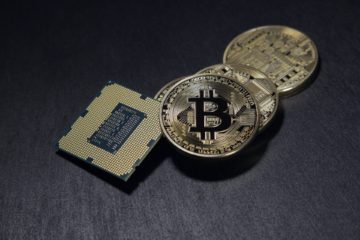
What is a blockchain?
There’s a lot of confusion on this subject, so let’s get things straight from the start.
According to Wikipedia a blockchain is:
“… a growing list of records, called blocks, which are linked using cryptography. Each block contains a cryptographic hash of the previous block, a timestamp, and transaction data (generally represented as a merkle tree root hash).
“By design, a blockchain is resistant to modification of the data. It is “an open, distributed ledger that can record transactions between two parties efficiently and in a verifiable and permanent way”.”
Put simply a blockchain is an open source ledger that records transactions. It’s a bit like having a spreadsheet that’s duplicated thousands of times over a network of computers. Every time one spreadsheet gets updated, they all get updated. Because no data is stored centrally, it’s impossible to hack, manipulate or corrupt.
No single entity (like a government) can control the blockchain. Because it’s duplicated over and over, there’s no single point of failure. If one part of the blockchain goes down, another part can be duplicated to take its place. Every transaction is recorded, so nothing is secret.
Pretty neat, huh?
The technology behind blockchains was invented by a guy called Satoshi Nakamoto (although some people think this may be pseudonym for a group of programmers) in 2008. The invention of the blockchain for the cryptocurrency Bitcoin made it the first digital currency to solve the double-spending problem without needing to have a trusted authority (like a central bank) or central server.
Like I said: Pretty neat!
Also check my post: Cryptocurrency Basics
This isn’t all about Bitcoin!
One question you may be thinking about right now is: Isn’t this all about Bitcoin?
The answer is a resounding: No!
Sure, Bitcoin is a cryptocurrency. The blockchain was invented for Bitcoin, But bitcoin ISN’T the only cryptocurrency out there.
As I write, there are over 4,000 different types of cryptocurrency in existence – some are variants of Bitcoin, while others are completely new, stand-alone cryptocurrencies.
Bitcoin is, of course, the granddaddy of them all, and it’s fair to say that there wouldn’t be any cryptocurrencies at all without Bitcoin. However, because Bitcoin is open source, ANYBODY (even YOU) can take the technology and start their own cryptocurrency.
At this point I need to make clear that there are two different types of cryptocurrency you can create. One is a coin, the other is a token. There are some pretty big differences between them, so listen up.
A coin (like Bitcoin, Litecoin, Dogecoin etc.) operates on its own blockchain. These cryptocurrencies have been started from scratch and are completely independent of each other. They act as money, and you can buy stuff with them, or convert them into Dollars or another “hard” currency.
A token, on the other hand, relies on an existing blockchain infrastructure. In other words, you don’t have to create your own blockchain, you just use a platform like Ethereum. You can use the features of your own cryptocurrency while benefiting from the security of the native blockchain.
Which is best? Well that depends!
The big upside to creating a coin is you have your own blockchain and you can control its development. All this takes time and costs a lot of (real) money.
The big upside to creating a token is you can use an existing blockchain – so you don’t have to go to all the hassle and expense of creating one yourself. However, you are reliant on other teams to make regular technical improvements.
4 Big Advantages of Blockchain
At the heart of the excitement surrounding cryptocurrency is blockchain technology. Blockchain technology is the foundation that all virtual currencies are built upon. It is the decentralized and digital ledger technology that records all of the transactions without needed a financial intermediary, like a bank. Blockchain technology appears to offer four distinct advantages over existing payment facilitation networks.
Transparency
One of the main reasons why blockchain is so intriguing is that the technology is always open source. This means that other users and developers have the opportunity to change it as they see fit. Being open source makes altering logged data within the chain, complicated, making blockchain technology particularly secure.
Reduced Transaction Costs
Blockchain allows peer-to-peer and business-to-business transactions to be completed without having to work with a third-party. Without the involvement of a middleman, like a bank, tied to the transactions in a blockchain, the costs to the user or business can be significantly reduced over time.
Faster Transaction Settlements
When dealing with traditional banks, it isn’t uncommon for a transaction to take days to become settled completely. This is because of the protocols established in bank transferring software, as well as the fact that most financial institutions are only open during the day. Blockchain technology, on the other hand, works 24 hours a day, seven days a week, which means transactions made with the blockchain technology can be processed more quickly.
Decentralization
Another reason why blockchain technology is so exciting is its lack of a central data hub. Rather than having to run a massive data center and verifying the transactions through the center, blockchain technology allows individual transactions to have their own proof of validity, as well as the authorization to enforce the constraints. Since information on a particular blockchain is piecemealed on individual servers throughout the world, it ensures that if hackers stole the data, they would only gain a small amount of data and not the entire network, keeping it from becoming completely compromised.
Even with these advantages, there is still a significant worry that can’t be overlooked. Throughout history, investors have continued to overestimate how quickly a new technology will be adopted. Like most new technologies it will take time to lay the groundwork for blockchain, and it could still be some years before businesses fully embrace this technology as a significant component of their payment systems.
5 Ways to Invest In Blockchain Technology Today
One of the hottest trends in the finance scene, blockchain technology has the potential to transform the traditional business model in numerous sectors completely. Similar to a massive digital spreadsheet, blockchain is shared by all the members of a decentralized network. Usually associated with confirming Bitcoin payments, blockchain technology can also be used in other ways. If you are considering investing in blockchain technology, here are five ways you can get started.
Stockpile Bitcoin
In anticipation of rising prices, many investors have taken advantage of an opportunity to stockpile bitcoins, just like they have with gold. While they are two different assets in that gold is a tangible item and bitcoins aren’t, the underlying investment principles remain the same.
Blockchain Penny Stocks
Believe it or not, there are even penny stocks for cryptocurrency. There are many other types of digital currency, other than bitcoin, that you can invest in, including Altcoins and Litecoin. The last several years have seen many alternative digital currencies being developed in an attempt to compete with Bitcoin and others that were designed specifically to fill those needs that were met by Bitcoin.
Altcoin Crowdfunding
To raise seed capital for various types of investments, crowdfunding has become a popular and mainstream method. If you want to get involved in blockchain technology, you might want to consider a unique crowdfunding method using alternative coins. With this investment method, the total coin supply is pre-mined and then sold in an initial coin offering, or ICO, before the network being launched publicly.
Angel Funding and Startup Ventures
While angel funding and startup aren’t a new concept, one variation that has started to gain traction is the idea of investing in startup built on blockchain technology. As Bitcoin becomes more popular and accepted by more mainstream businesses, the number of entrepreneurs interested in the technology has skyrocketed.
Pure Blockchain Technology Play
The number of pure blockchain technology plays is on the rise. Companies like hashing Space Corporation, Global Arena Holding, and BTCS, Inc., are quickly becoming well-known names in the space. BTCS, for instance, works to secure blockchain via its distinctive transaction verification services.
While many believe that blockchain technology and cryptocurrency are nothing more than a fad, these technologies continue to gain steam and could have the power to change the world as we know it. Deciding to become involved in the blockchain technology boom, could result in a significant payout.
Takeaway
Here are some of the most common questions that people have regarding blockchain technology and how it could impact them.
- What is blockchain?
- What is a private blockchain?
- What is a smart contract?
- How is blockchain related to Bitcoin and Ethereum?
- Can I use blockchain technology?
- What does blockchain have to do with Bitcoin?
- What is mining in regards to blockchain technology?
- What makes blockchain so secure and how does this relate to me?
- How is blockchain going to change the world?
If you’re like a majority of the population, you’ve probably asked these questions and more about blockchain technology and the hype surrounding the emerging technology.
The key to fully understanding blockchain technology and deciding if it is something that you should invest in, is diving in and doing the research.
Fortunately, I’ve compiled a comprehensive guide that will discuss what blockchain technology is and how it can be used in various industries.
You’ll learn blockchain basics and see how it is changing the face and future of the Internet.
Get Instant Access right now to this Incredible Guide and Benefit from the Future of Technology today.




